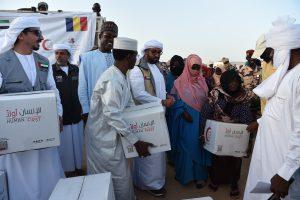AMDJARASS / WAM
An Emirati humanitarian delegation, led by the Emirates Red Crescent (ERC), the Zayed bin Sultan Al Nahyan Charitable and Humanitarian Foundation (Zayed CHF) and the Khalifa bin Zayed Al Nahyan Foundation (KF), launched an initiative to distribute food parcels to Sudanese refugees and the local community in the city of Amdjarass, Chad, in coordination with the UAE’s Ministry of Foreign Affairs.
Due to the current situation in Sudan, the delegation currently in Chad intensified its recent efforts to fulfil the UAE leadership’s directives to ease the suffering of Sudanese refugees.
The launch of the aid distribution initiative was attended by representatives of the Emirati humanitarian organisations, as well as Isaac Malwa Jamous, Governor of Ennedi Est Region, and Aboud Hashem Bedir, Mayor of Amdjarass, along with representatives of charitable organisations in Chad.
Dr Ahmed Obaid Al Dhaheri, Head of the ERC Delegation in Chad, said that under President His Highness Sheikh Mohamed bin Zayed Al Nahyan’s guidance, the UAE has responded to the humanitarian duty to support the Sudanese people.
Representatives of the ERC, supervised by HH Sheikh Hamdan bin Zayed Al Nahyan, Ruler’s Representative in Al Dhafra Region and Chairman of the ERC, Zayed CHF and KF, distributed food parcels to the refugees, to ease their suffering and provide for their essential needs, as part of the joint international efforts of various countries and organisations.
Al Dhaheri expressed his gratitude to Chad and its government for allowing humanitarian organisations to deliver aid, affirming their continuous commitment to supporting refugees and those in need, and easing their hardships.
For his part, Governor Jamous lauded the UAE’s efforts to distribute food parcels and address the requirements of Sudanese refugees and the local community, reflecting the dedication of Emirati humanitarian organisations to deliver aid to those in need.
The Emirati humanitarian team currently in Amdjarass is assessing the needs of Sudanese refugees and the local community, through conducting field visits and closely observing their living conditions, to provide for their essential requirements.
 The Gulf Time Newspaper One of the finest business newspapers in the UAE brought to you by our professional writers and editors.
The Gulf Time Newspaper One of the finest business newspapers in the UAE brought to you by our professional writers and editors.
